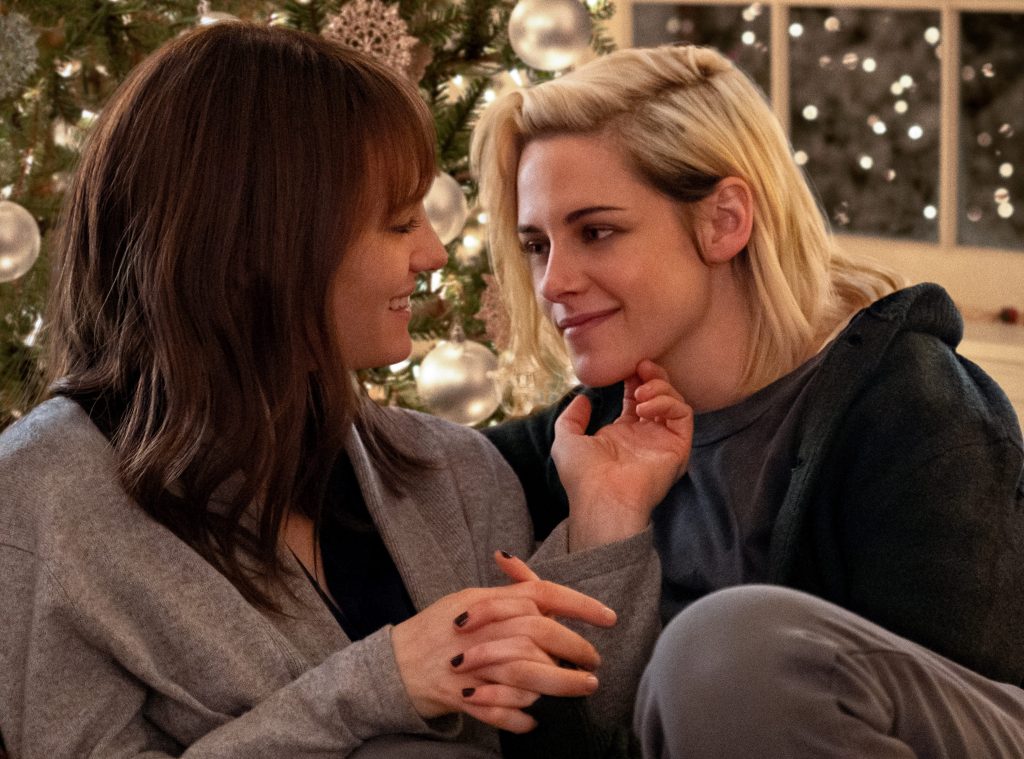Happiest Season is another entry in a long line of Christmas-themed romantic comedies. What makes it different, however, is that it’s about a lesbian couple who have to hide their relationship because one of them is still in the closet, and also the fact that it’s directed by an openly gay female director in Clea DuVall, and one of the leads, Kristen Stewart is also bisexual.
Abby (Kristen Stewart) and Harper (Mackenzie Davis) are visiting Harper’s parents for Christmas. On the way, Harper reveals that she hasn’t yet come out to her family and that they have to pretend to be straight roommates. Abby, who had been meaning to propose to Harper, reluctantly agrees. Once in town, Abby meets Ted (Victor Garber), who’s running for mayor, and Tipper (Mary Steenburgen), who is image-obsessed and bent on making sure her husband’s campaign goes perfectly. There’s also Jane (Mary Holland, who also co-wrote the film with DuVall), the dutiful sister and Sloane (Alison Brie), the other sister who has always butted heads with Harper.
They are the kind of family who are politely conservative and have always expected their children to behave a certain way. As Abby tries to get through the five days despite being a terrible liar, she wonders who Harper really is, especially when she spends time with her ex-boyfriend, Connor. Abby, on the other hand, develops a rapport with Riley (Aubrey Plaza), Harper’s first girlfriend and also the first casualty of refusing to come out of the closet.
Stewart gets to stretch her comedic chops outside of SNL, trying her best to navigate around Harper’s family, which gets difficult once she’s accused of shoplifting in a mall. The chemistry she has with Plaza is surprising, to the extent that you wonder if she may be better off with her instead. Of course, Happiest Season plays it far too safe to even consider veering off in such a direction.
Mackenzie Davis is also up to the task, balancing her act as the perfect daughter on one hand while handling her rapidly straining relationship with Abby on the other hand. While you empathize with her plight, the film makes it a point to suggest that she’s wronging Abby by forcing her to go along with it, as spelled out by Abby’s gay best friend, John (Daniel Levy).
The film isn’t outright funny, rather it is light-hearted. It does get a bit too on the nose when Abby literally gets stuck in a closet. The climax also gets a bit too over the top, in the way you would expect it to in a film like Bridesmaids. By the time Harper finally tells the truth, Abby is too heartbroken. Of course, they reconcile by the end and everything is okay, down to Ted sacrificing his political aspirations for his daughter’s happiness. But you feel that maybe the film is too constrained by its genre conventions.
While the film touches on important and sensitive issues, it doesn’t take itself too seriously.
Is the film better off for it? Depends on how you look at it. Perhaps, DuVall is content with creating a more mainstream story than trying to make a more important one. As it stands, Happiest Season feels like the kind of movie we should have had years, if not decades, ago. Let’s hope future offerings in this vein get even better.
